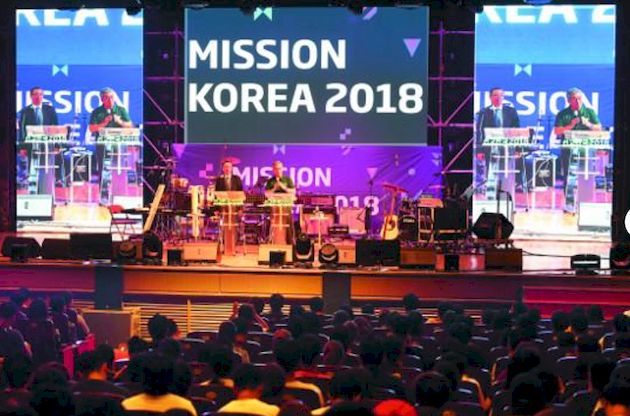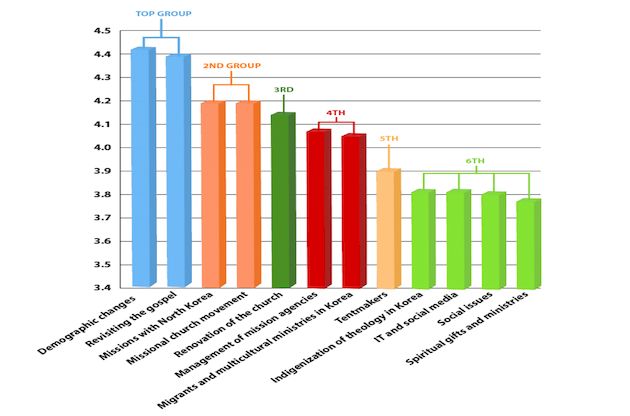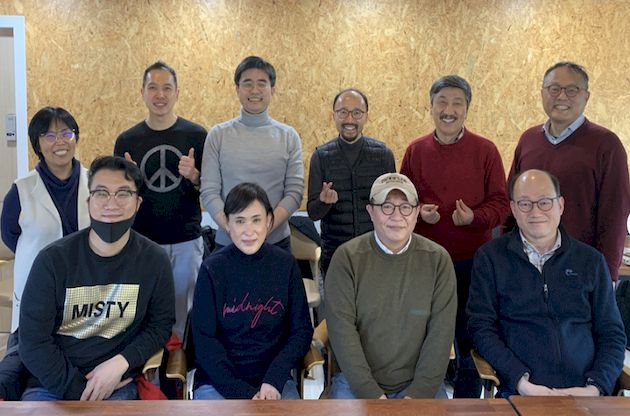The number of Christians in Korea has plateaued for the past two decades since 2000 and has decreased drastically in recent years.
![Image via [link]Lausanne Movement[/link]](https://cms.evangelicalfocus.com/upload/imagenes/64d9492940cbc_missionchanging.jpg) Image via [link]Lausanne Movement[/link]
Image via [link]Lausanne Movement[/link]
Korean churches have been committed to cross-cultural missions for decades. They have officially sent out more than 22,000 missionaries abroad in 2021.[1]
However, things are not what they used to be.
Changes in mission contexts have grown over the years with increasing nationalism, difficult visa situations, and an influx of migrants to Korea. Symptoms of change and confusion in mission were present long before the COVID era.
The most palpable blow was a systemic eviction of Korean missionaries from a restrictive access country in 2017 and 2018.
The number of Korean missionaries in this country was once more than 4,000 and has dropped to less than 40 percent of 4,000, according to the data in 2022.[2]
Another critical change was the decline of Christianity in Korea. The number of Christians in Korea has plateaued for the past two decades since 2000 and has decreased drastically in recent years.[3]
The problem is not just with the number. Society’s trust toward Christians is at its record low.[4] Churches that used the heavy leverage of debt with the expectation of member increase now face decreased income with high interest rate.
As a result, the church and the infrastructure of mission are now struggling.
With the backdrop of these challenges, Mission Korea, which is the biggest mission mobilization effort for youth, launched a research team of eight experts to uncover the future of missions.
The completed report was presented at the 2018 Mission Korea conference.[5]

A research project to determine the future of Korean mission was launched at the 30th anniversary of the Mission Korea conference.
The project came from a recognition that the purview of mission in Korean mission circles could be limited because of their previous focus on church planting and evangelizing the unreached.
The research team needed a different reference for mission in the survey to include activities beyond evangelism and church planting. Past Lausanne documents were reviewed through a content analysis to list all the possible expressions of mission.[6]
The final survey with 99 items in the expressions of mission was sent to 373 mission leaders, and 62.5 percent of them responded.[7]
The items were categorized into 12 mission issues, which were then put into six different groups in the order of statistical importance based on the responses:
1st group: ‘Demographic changes in society and the church’ and ‘Revisiting the gospel’
2nd group: ‘Missions with North Korea’ and ‘Missional church movement’
3rd group: ‘Renovation of the church’
4th group: ‘Management of mission agencies’ and ‘Migrants and multicultural ministries in Korea’
5th group: ‘Tentmakers and Business as Mission (BAM)’
6th group: ‘Indigenization of theology in Korea’, ‘IT and social media’, ‘Social issues in the public arena’, and ‘Spiritual gifts and ministries’

[photo_footer] Future issues of Korean mission by their importance.Different colors indicate statistically significant differences. [/photo_footer]
The results were quite different from the past focus on unreached peoples. The issue of ‘demographic change’ in the first group can be interpreted as a question: ‘With all the changes in the composition of members of society and the church, where should we go now?’
Another issue of ‘revisiting the gospel’ being in the first group suggests that we should go back to the message of the gospel and start again.
The issues from the second to fourth groups do not include anything related to unreached peoples, either. The respondents have indicated that works in North Korea and among immigrants and renovation of the church are needed.
Issues in the fifth and sixth groups were evaluated as being not so highly important compared to the issues in the preceding groups. They are about the roles of individual Christians in society.
The research team was puzzled by this result. The content analysis of the Lausanne Movement conducted as part of this research showed a trend of global mission towards social participation in the public arena, such as creation care, peace and reconciliation, relieving polarization of society, and assisting social minorities.
32 of the 100 items listed were grouped under ‘social issues in the public arena’. When all the results were considered together, the leaders in the sample seemed to say that something had gone wrong, and they tried to find a solution at the institutional level.
However, they did not seem to see the diverse roles of individual Christians living in the world.
At the end, the team suggested three implications for the future trends of mission for the Korean church:
Mission by all: The future players of mission will be ordinary people with different talents and experiences.
Mission in the public square: The future venue for mission will be everywhere, in all parts of the society.
Integral mission: Witnessing to the gospel will be through personal relationships and by the credibility built over the years in those relationships.
Korean churches well remember the Japanese colonial period, when many Western missionaries came into Korea. Unlike other countries under Western colonial powers during that period, Korea did not receive missionaries from its colonizer.
This left two legacies in the Korean church.
First, mission is something desirable and even mandatory for Christians. Second, mission is about cross-cultural outreach.
Since Korean churches grew to have enough resources for overseas mission in the 1980s, they engaged in missions focusing on unreached peoples and church planting. However, as presented in the research summary above, there is a need to revisit and expand the concept of mission in the present time.
A small group of mission leaders and church pastors have been gathering since 2017 to help local churches and missionaries embrace more diverse ways of mission.
Christopher Wright’s book The Mission of God’s People was thought to be a good guide for this purpose, and they started a school using the materials in the book to help Christians find their own mission through sharing lives in small groups.[8] The school was called Life As Mission School (LAMS).[9]
The God of mission restoring the world works in and through a person’s life as well. Some find mission in restoring endangered species; some in assisting estranged elderly people in remote villages; some in teaching Korean to Muslim immigrant girls in Itaewon, Seoul; and some in listening attentively to their own children suffering from depression.
Mission is neither just about ministries overseas nor proprietorship of missionaries. The mission of God is holistic; it embraces both spiritual and physical needs.
The following are a few testimonies of the participants in the school:
‘I always felt confused and guilty in my identity for the last 10 years though I had been active in helping missionaries. It was because I thought I could not become one of them. Now I realized that I was already sent to a medical mission field with young professionals that work with me.’ (Sang Hyup Lee, a medical doctor who runs LAMS for medical workers and young people)
‘I thought church education for mission was only for the ones who went out for short-term mission trips. Now we can help all the members live out mission where they are!’ (Young Suk Yoon, a minister participated in LAMS for pastors)
‘I did not know that evangelicals took the wellbeing of land seriously. I was pleased to find that the Bible teaches us about our connection to the lives around us and gives us the hope of a new earth.’ (Ryoung Kim, an organic strawberry farmer who participated in LAMS as a facilitator)

The LAMS school was expanded over the last five years to different groups and places, such as doctors and nurses, hospitals, businesses, young professionals, missionaries in Muslim nations and other regions, universities, mission organizations, and local churches.
The schools are not centrally organized, but they grew into different contexts. Recently, a small group of laypeople even developed a book called Missions of God’s Children, aiming at elementary and middle school kids by adapting Wright’s book.
It is going to be published by IVP Korea in the coming months. All this is a rise of a movement.
The zeal and dedication of Korean churches for cross-cultural mission is a precious heritage to retain. However, changes and challenges in and out of Korea require the church to embrace the diversity of mission.
The diversity of mission can be found when God’s works in the life of people and community are reflected and appreciated.
The word ‘mission’ in Korean is pronounced sun gyo. Its literal meaning is to spread a religion. This word carries strong connotation of the nuance of the past ways of missions.
So my colleagues and I often intentionally use the word missional without referring to its English meaning. It sounds like ‘mission-eol’, and eol in Korean means the collective spirit of a community.
It also carries a notion of something noble. Mission-eol implies that the Holy Spirit of the God of mission is present and working among the followers of Jesus.
This is the Spirit we want to plant through the LAM movement. This Spirit once anointed Jesus Christ, and now it awakens people and connects them to be a new wave of mission to reflect the glory of the Lord together, just as prophesied by the prophet Isaiah and proclaimed by Jesus Christ our Lord himself.
Sam Cho is the director of Interserve Korea. He worked as a project coordinator for the establishment of the Pyongyang University of Science and Technology.
He is also a Business as Mission (BAM) ambassador in Korea for BAM Global and the Lausanne BAM Network. He holds a PhD in management and an MDiv as his educational background. He currently lives in Sungnam, South Korea, with his wife, Soo.
This article originally appeared in the July 2023 issue of the Lausanne Global Analysis and is published here with permission. To receive this free bimonthly publication from the Lausanne Movement, subscribe online at www.lausanne.org/analysis.
‘1. 2022 Korean Mission Statistics’ (written in Korean), Korea Research Institute for Mission (KRIM), accessed February 14,, 2023,
2. Ibid.
3. ‘Religions of Koreans 1984–2021 Report’ (written in Korean), Gallup Korea, accessed February 10, 2023,.
4. ‘2023 Social Credibility in the Korean Church Report’ (written in Korean), Christian Ethic Movement, accessed February 13, 2023, h. This research was conducted by Christian Ethic Movement every year since 2008. Christian Ethic Movement is a well-respected network and movement of Protestant Christians since 1987. The survey was collected in April 2022. The result shows that only 21% of Koreans trust the church; that means four out of five Koreans do not trust Korean churches.
5. ‘Future Issues of Korea Mission’ (written in Korean), Mission Korea,.
6. This initial work that I did was extended to a research team for better reliability. All the LOPs were read through peered content analysis. When the frequencies of words in LOPs are compared by years of publications, the mission focus of Lausanne Movement seems to have changed over the years from being more cross-cultural and religious issues to being more social and public issues. Its results and implications are in the process of being written for publication in both English and Korean.
7. The initial list was presented to and discussed in a focused group of 40 mission leaders to produce 99 items. The following online survey asked respondents of a bigger sample to mark on a Likert scale the degree of importance of each item in light of the future of mission.
8. Christopher J. H. Wright, The Mission of God’s People: A Biblical Theology of the Church’s Mission (Grand Rapids, MI: Zondervan, 2010).
9. The initial group who coined the term ‘Life As Mission’ and started the school in 2017 has just recently formed an official entity called LAMS in December 2022.
10.The LAMS team came from all different backgrounds, such as missionaries from GBT, Interserve, and WEC; staff members from Mission Korea; a businesswoman; and two local church pastors.

Las opiniones vertidas por nuestros colaboradores se realizan a nivel personal, pudiendo coincidir o no con la postura de la dirección de Protestante Digital.
Si quieres comentar o